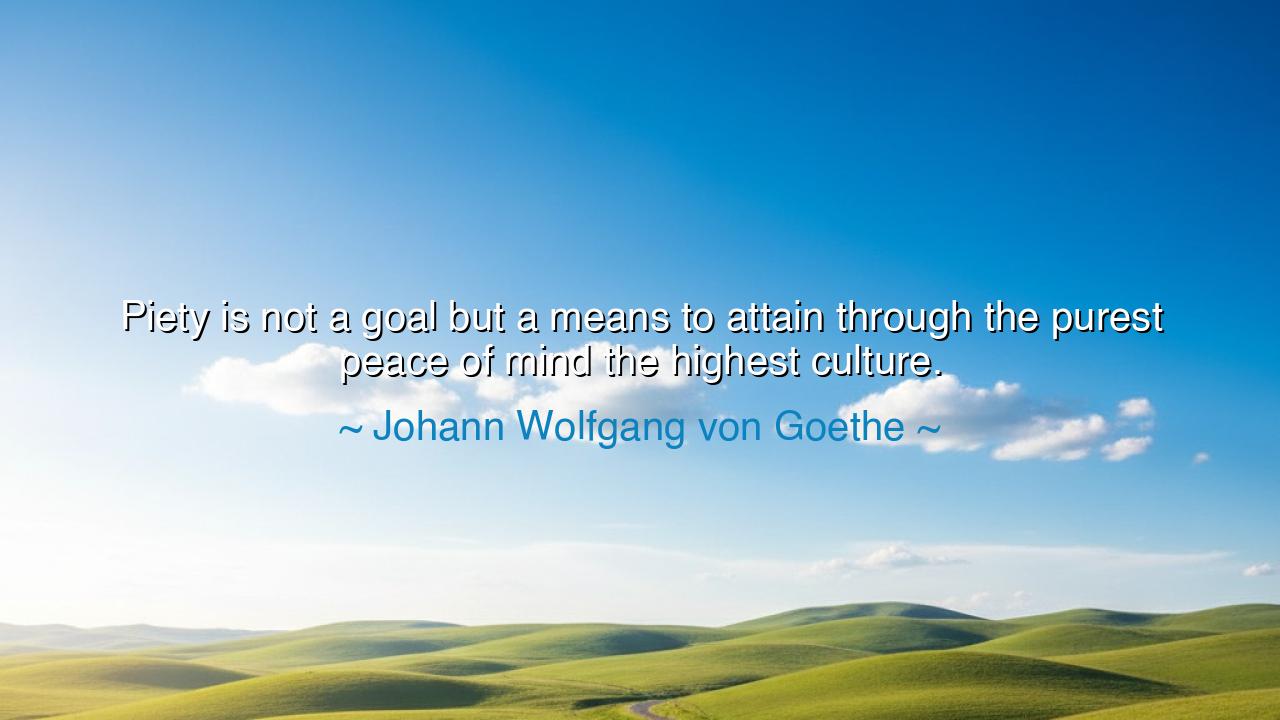
Piety is not a goal but a means to attain through the purest
Piety is not a goal but a means to attain through the purest peace of mind the highest culture.






"Piety is not a goal but a means to attain through the purest peace of mind the highest culture." These words, spoken by Johann Wolfgang von Goethe, illuminate a timeless principle: piety, in its truest sense, is not an end in itself but a path—a means to a higher, more profound purpose. Goethe, the great German writer and philosopher, understood that religious or spiritual devotion, when practiced with sincerity and humility, can lead to the cultivation of the mind and the soul. Piety, in this light, is not a rigid adherence to rituals or dogmas, but rather a tool that helps to purify the spirit, leading to peace and, ultimately, to the highest culture—a state of wisdom, understanding, and refinement.
In the ancient world, piety was often regarded as the highest virtue. The Greeks, with their rich tradition of philosophy and thought, also placed great emphasis on living a life of devotion to gods and goddesses, but their concept of piety was always tied to wisdom and virtue. Socrates, for example, spoke often of the importance of inner purity and moral integrity, believing that devotion to the divine should align with the search for truth and goodness. In his famous work, Apology, Socrates suggests that true piety involves a commitment not just to outward forms of worship, but to the cultivation of virtue—the highest form of piety. Just as Goethe reflects, the purpose of devotion is not the act itself, but the transformation it brings to the individual, allowing one to live in alignment with the highest truths of life.
Similarly, the Romans, particularly figures like Cicero, held piety in high regard but understood that true devotion must lead to moral refinement and intellectual growth. Cicero’s view of religion was grounded in the belief that worship and devotion were not to be pursued for their own sake but should serve as a means to cultivate a just and virtuous life. In his works, he often spoke of the necessity of aligning one’s actions with reason and righteousness, believing that only through such alignment could true peace of mind and the highest culture be attained. For both Socrates and Cicero, the act of piety was deeply connected to the pursuit of knowledge and the cultivation of an inner peace that transcended mere ritual.
Goethe’s own life reflects this understanding of piety as a means to higher culture. Known for his profound contributions to literature, philosophy, and science, Goethe was a man who believed that the pursuit of beauty, truth, and wisdom was a spiritual practice in itself. His work, especially Faust, explores the relationship between human striving, divine inspiration, and the quest for inner peace. Through Faust, Goethe illustrates the idea that the higher culture—the refinement of the spirit, mind, and heart—can only be achieved when one aligns their actions with the divine purpose of life. Piety, in Goethe’s understanding, is not the worship of external gods alone, but a devotion to the higher ideals of humanity, seeking peace of mind through an ever-deepening connection to the divine and universal truths.
In more recent history, Mahatma Gandhi, the leader of India’s independence movement, exemplified Goethe’s philosophy in his own life. Gandhi’s piety was not confined to ritualistic worship, but instead was a deep, personal commitment to truth and non-violence—principles that were rooted in his spiritual beliefs. Gandhi believed that true piety could only be realized when it was linked to the service of others and the pursuit of peace and justice. He lived a life of simplicity, devotion, and intellectual growth, demonstrating that spirituality is not a detached or passive experience but an active engagement with the world. Through his life and work, Gandhi showed how piety leads to the refinement of character, fostering a higher culture of peace and cooperation.
The lesson of Goethe’s words, then, is one of purpose and transformation. Piety, in its deepest sense, is not about performing duties for their own sake or seeking approval from the world, but about transforming one’s own character and aligning with the highest principles of truth, love, and justice. It is about living in a way that cultivates inner peace, allowing one to embody the highest culture—a culture of wisdom, understanding, and compassion. Piety is the means through which we can elevate our minds and hearts, leading to a life of fulfillment and contribution to the greater good of society.
In your own life, reflect on how piety—whether through religious devotion, personal values, or commitment to higher ideals—serves as a means to cultivate the peace and wisdom you seek. Are you using your spiritual practices or daily actions as a way to refine your inner self, to live in alignment with truth and virtue? Seek not just to perform rituals, but to transform through them, allowing each act of devotion to guide you toward the highest form of culture—one that is built on love, understanding, and the pursuit of peace. By embracing this deeper purpose, you can unlock the full potential of piety to elevate both your own life and the lives of those around you, cultivating a world that thrives on wisdom and peace.






AAdministratorAdministrator
Welcome, honored guests. Please leave a comment, we will respond soon